From broken taps to missing soap: Why it's so hard to clean up coffee shop, hawker centre toilets
Toilets in Singapore's coffee shops and hawker centres remain notoriously filthy despite decades of campaigns and enforcement. As the blame shifts among operators, customers and the authorities, is it time for stricter penalties or a total rethink of public toilet hygiene?
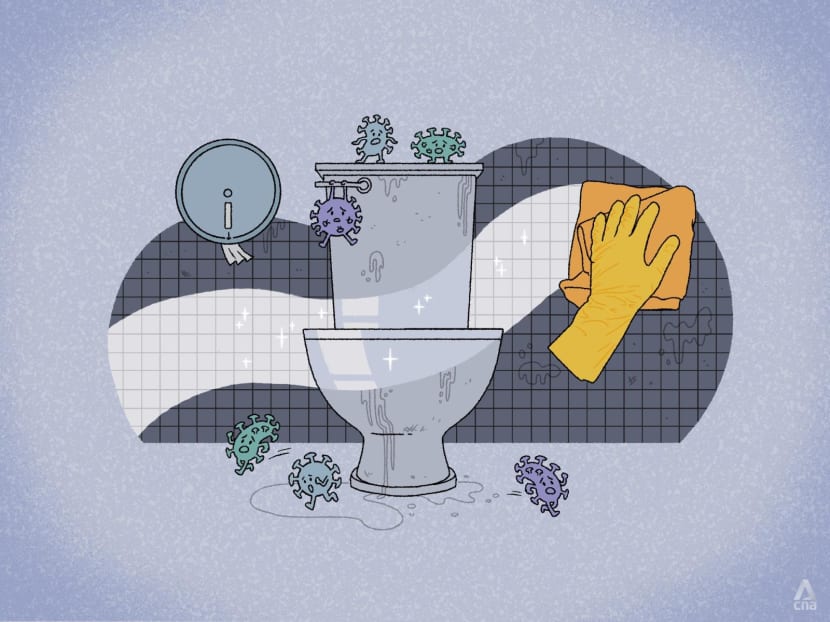
After visiting 36 hawker centres and coffee shops in Singapore, CNA TODAY found that nearly half were dirty. (Illustration: CNA/Nurjannah Suhaimi)

This audio is generated by an AI tool.
No matter how packed the coffee shop gets during lunch hour, there is a table that hairdresser Jasmine Ong will avoid at all costs – the one right next to the toilet.
Because she knows that if she were to sit there, she would have to tolerate the putrid scent of human excrement instead of the mouth-watering aroma of hawker fare.
“I don’t even step foot into the toilet. Going near it is already horrifying enough,” the 35-year-old said. “Just thinking about (the toilet) makes me lose my appetite.”
Not everyone can be as particular about this. For 30-year-old Syafiq, a medic who goes by only one name, coffee-shop toilets are sometimes his only option when he is out on duty and needs to answer the call of nature.
“Sometimes, the toilets are wet or oily … and some are not even equipped with essential items like toilet paper or soap,” he said, adding that the smell of urine and faeces can be unbearable.
“If there’s a bidet, I will wash off the dirt on the toilet before using it … but (shouldn’t toilets) be generally clean enough to use without (people feeling disgusted)?”
It’s not just patrons who feel this way. Hawkers, too, spoke of their disgust when the toilets at the venues they work at are filthy – with some choosing to go to toilets in nearby shopping centres if they have the time and someone else to tend their stalls.
One hawker, who declined to be named to avoid his landlord’s wrath, said: “I don’t know how people use the toilet, but I’ve even found (faeces) on the ceiling.”
Another hawker said that at the hawker centre where she works, the flush in the women's toilets constantly fail to work, leaving some cubicles there with toilet bowls that are perpetually not flushed and festering with flies.
“There’s a 10-cent fee to enter, but sometimes, the toilets are so dirty because people don't flush,” she said in Mandarin.
What these anecdotes reflect is a reality that many Singaporeans probably know all too well: That despite decades of public awareness campaigns and enforcement actions, many of the porcelain thrones in coffee shops and hawker centres here are in a dire state.
In a nationwide survey by the Singapore Management University (SMU) last year, toilets at coffee shops have been consistently dirty for eight years and toilets at hawker centres have shown slight improvement over the years.
Cleaning a toilet seems like a straightforward enough matter, but what makes it tricky is that it has been hard to pin down who is responsible for this sorry state of affairs.
Operators of and workers at coffee shops and hawker centres blame customers for misusing their toilets and being inconsiderate. Customers blame operators for not cleaning the toilets frequently enough.
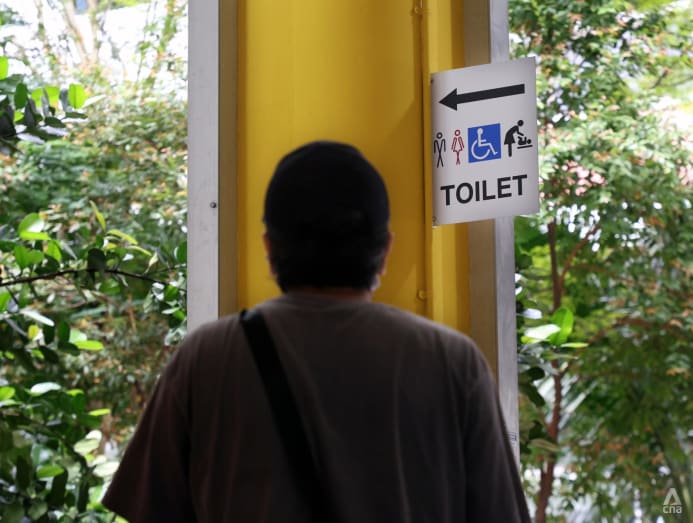
Advocates for clean toilets believe that the government should enhance enforcement actions and raise penalties for toilet cleanliness lapses, to pressure operators into polishing up their amenities.
As part of efforts to improve the situation, a task force was set up last year to study and recommend solutions to improve the cleanliness of public toilets here.
In line with its recommendations, Mr Baey Yam Keng, Senior Parliamentary Secretary for Sustainability and the Environment, who also co-chaired the task force, announced on Mar 4 several initiatives to clean up toilets. These include two grants of S$5 million each to support coffee-shop operators in implementing good toilet designs and deep-cleaning their toilets.
SMELLY, DIRTY, GRIMY
Singapore is home to 121 hawker centres, with 107 managed and maintained by the National Environment Agency (NEA) and town councils. The rest are social enterprise hawker centres managed by operators appointed by the agency.
There are 800 coffee shops in various public housing estates, some owned by private operators and others owned by the Housing and Development Board (HDB) and rented to operators. There is no exact figure for the number of coffee shops operating on private properties.
Between Mar 5 and 11, CNA TODAY visited 36 toilets in hawker centres and coffee shops across the island.
Nearly half of the toilets were dirty – some had stains and unflushed toilet bowls, while others had litter, unflushed toilets or human excrement on the floor, toilet seat and, occasionally, the walls.
Some also had food remains in the sink, wet floors with no proper ventilation or grime coating the toilet tiles.
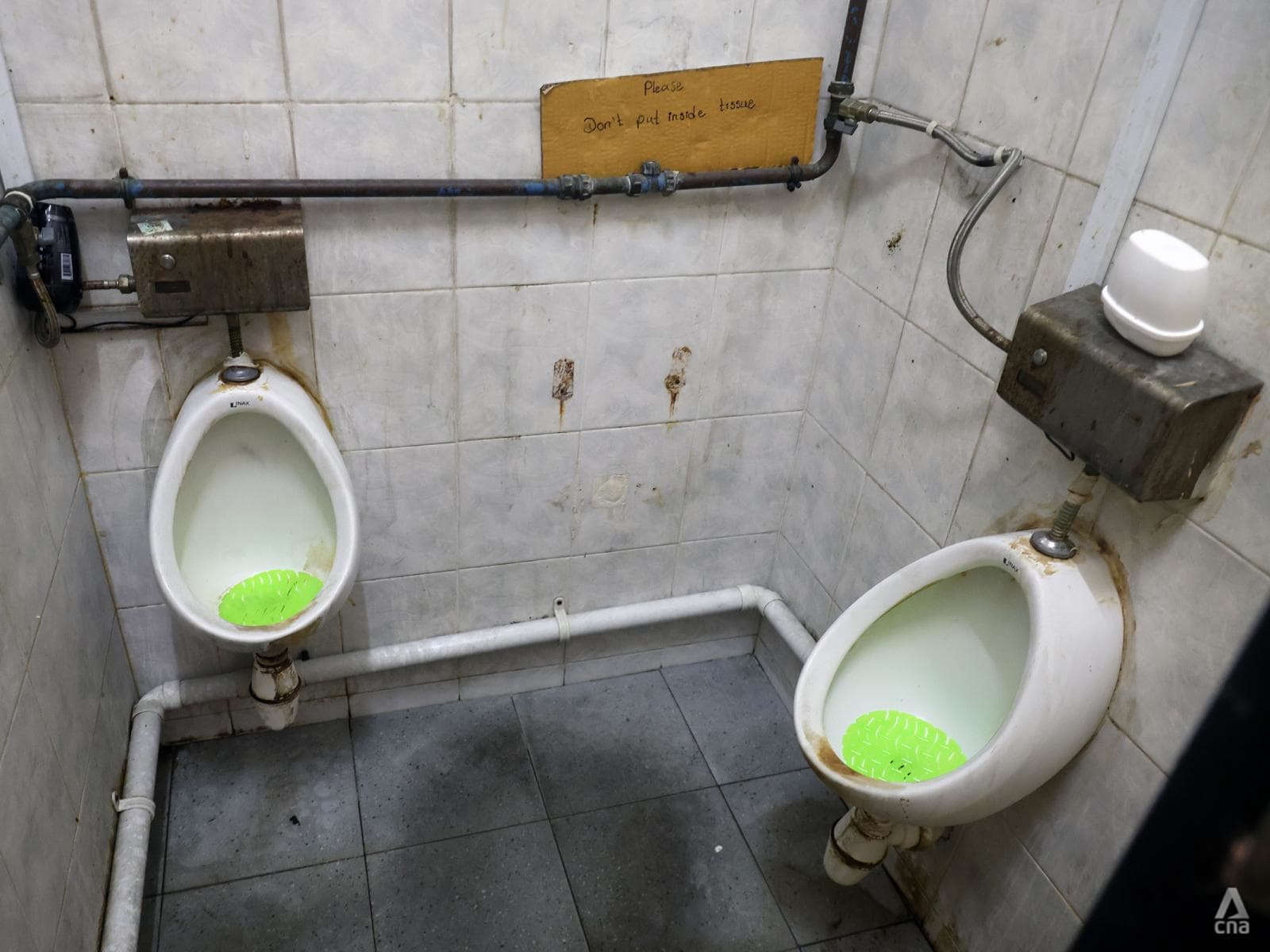
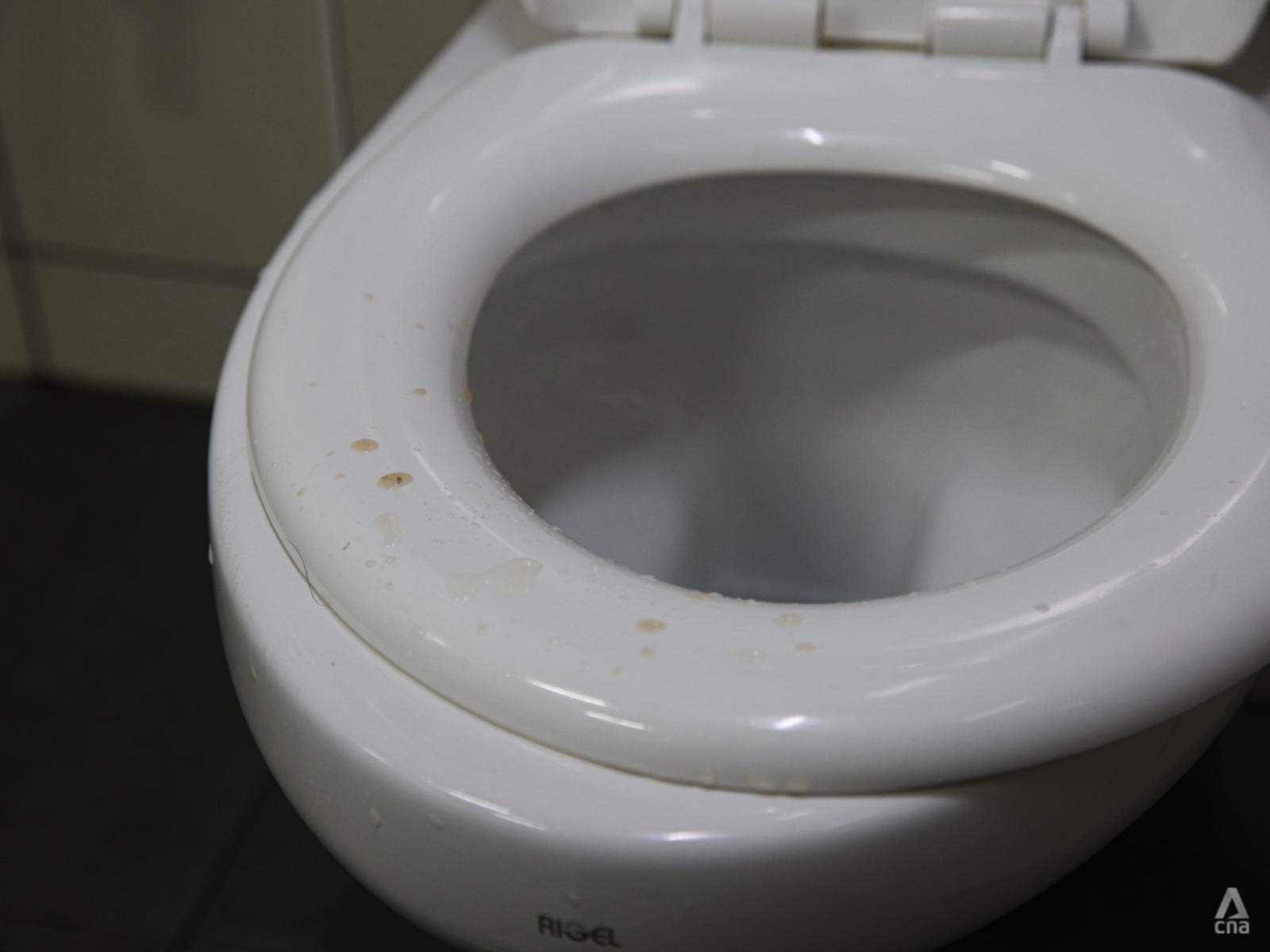
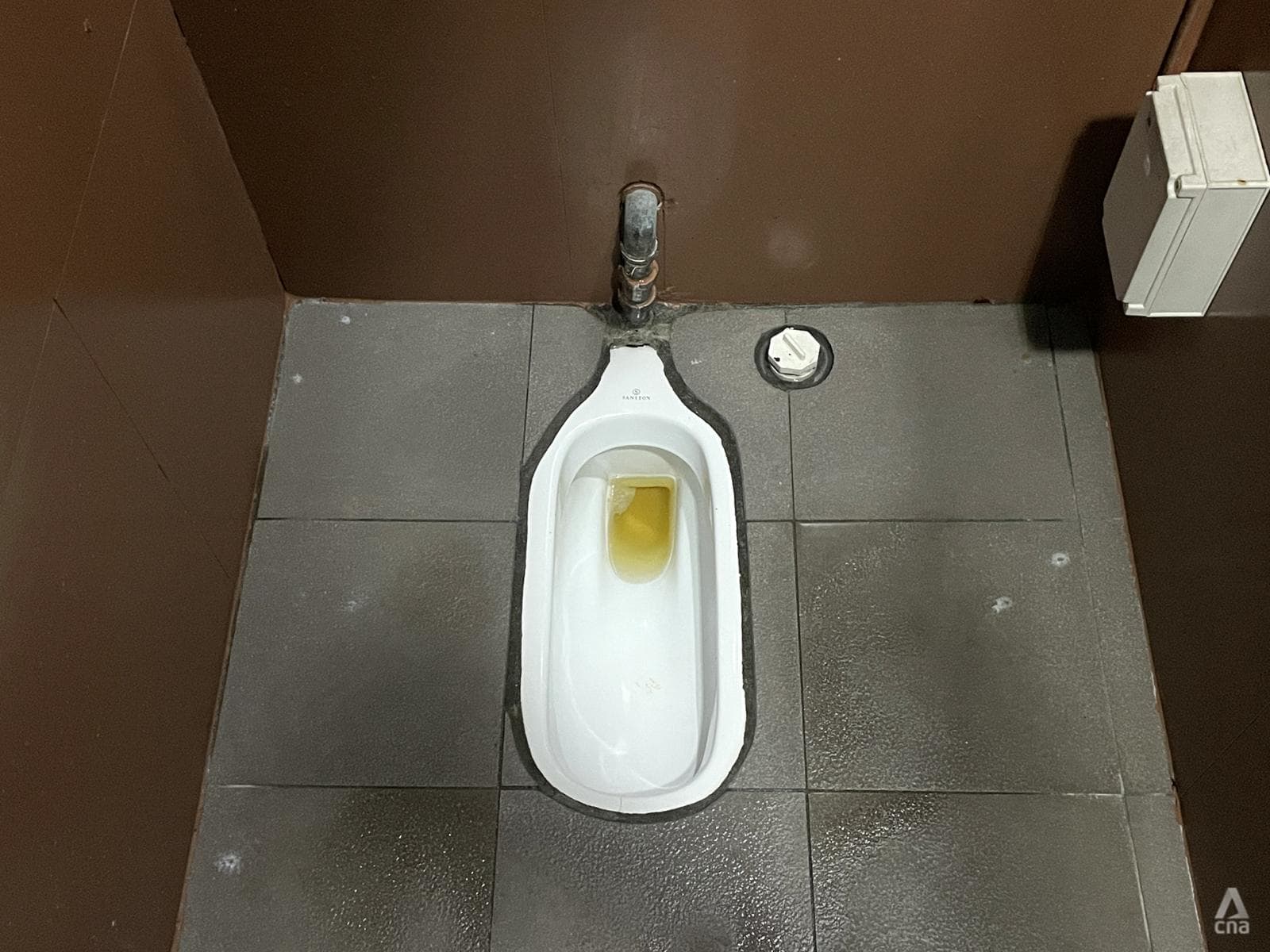
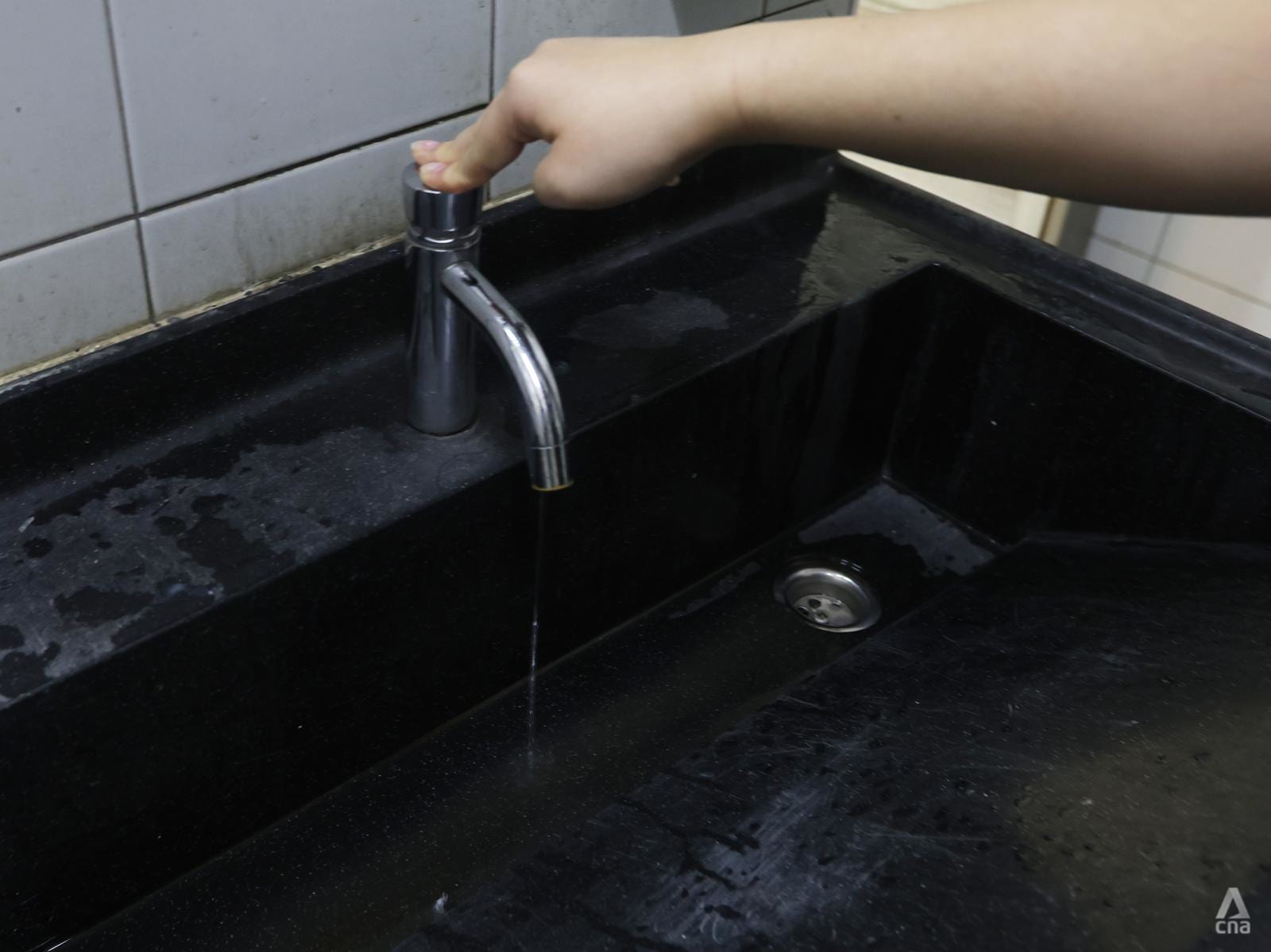
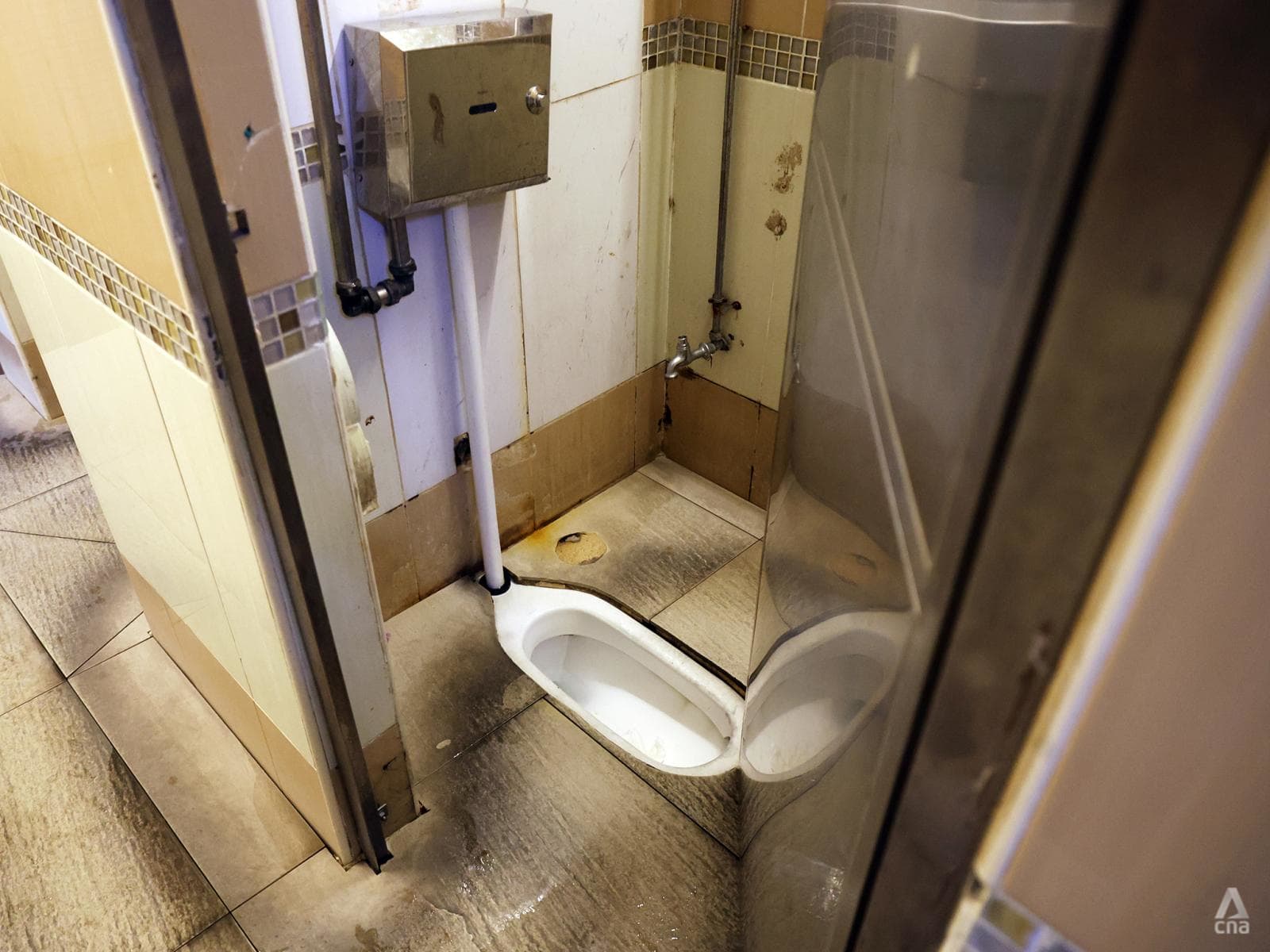
At least 10 toilets that CNA TODAY visited were missing basic toilet amenities legally required in public toilets, namely toilet paper, liquid soap, litter bins and hand dryers or paper towels.
One coffee shop in Yishun had a broken tap, which meant that food sellers or handlers as well as patrons could not use the sink to wash their hands.
In one toilet at a hawker centre and three toilets at coffee shops, the soap was watered down so much that it would not foam. Most coffee shops visited also required patrons to buy toilet paper for between 10 and 30 cents, or to ask for toilet paper from the stall selling drinks.
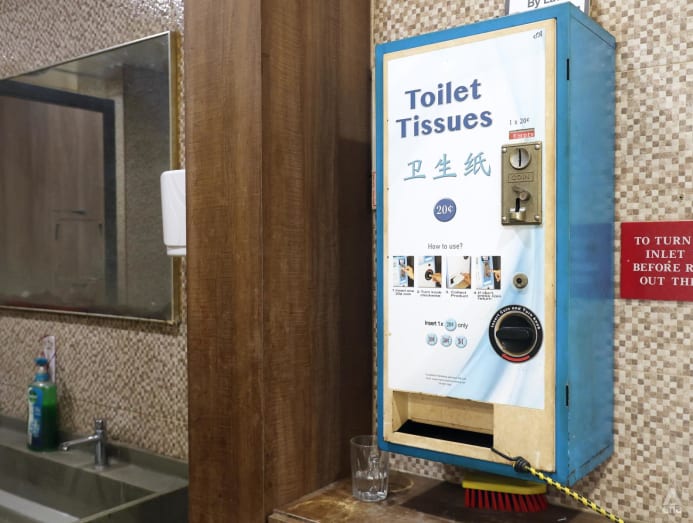
Several toilets visited were also poorly built with small cubicles, or have no ventilation or questionable layouts.
At one particular coffee shop in Geylang, CNA TODAY found what could only be described as an odd toilet layout: Two squat toilets next to each other within one cubicle, separated only by a small divider. Each toilet would only flush if the user pressed the flush button – with some pressure – for about five seconds.
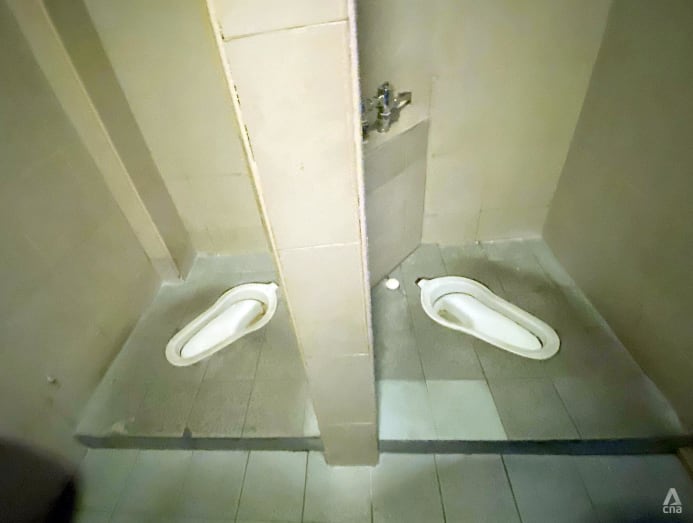
CNA TODAY also visited another coffee shop in Geylang that had been suspended for a day by the authorities on Feb 21. The operator had accumulated 12 demerit points in under a year for not keeping its toilet in a clean state.
In the washroom for women, the toilet seat and tiles had yellowed but did not smell bad. The cubicle’s door sliding latch was broken and replaced with a disposable chopstick.
In the men’s toilet, the toilet bowl looked white and stainless, and the urinals were clean.
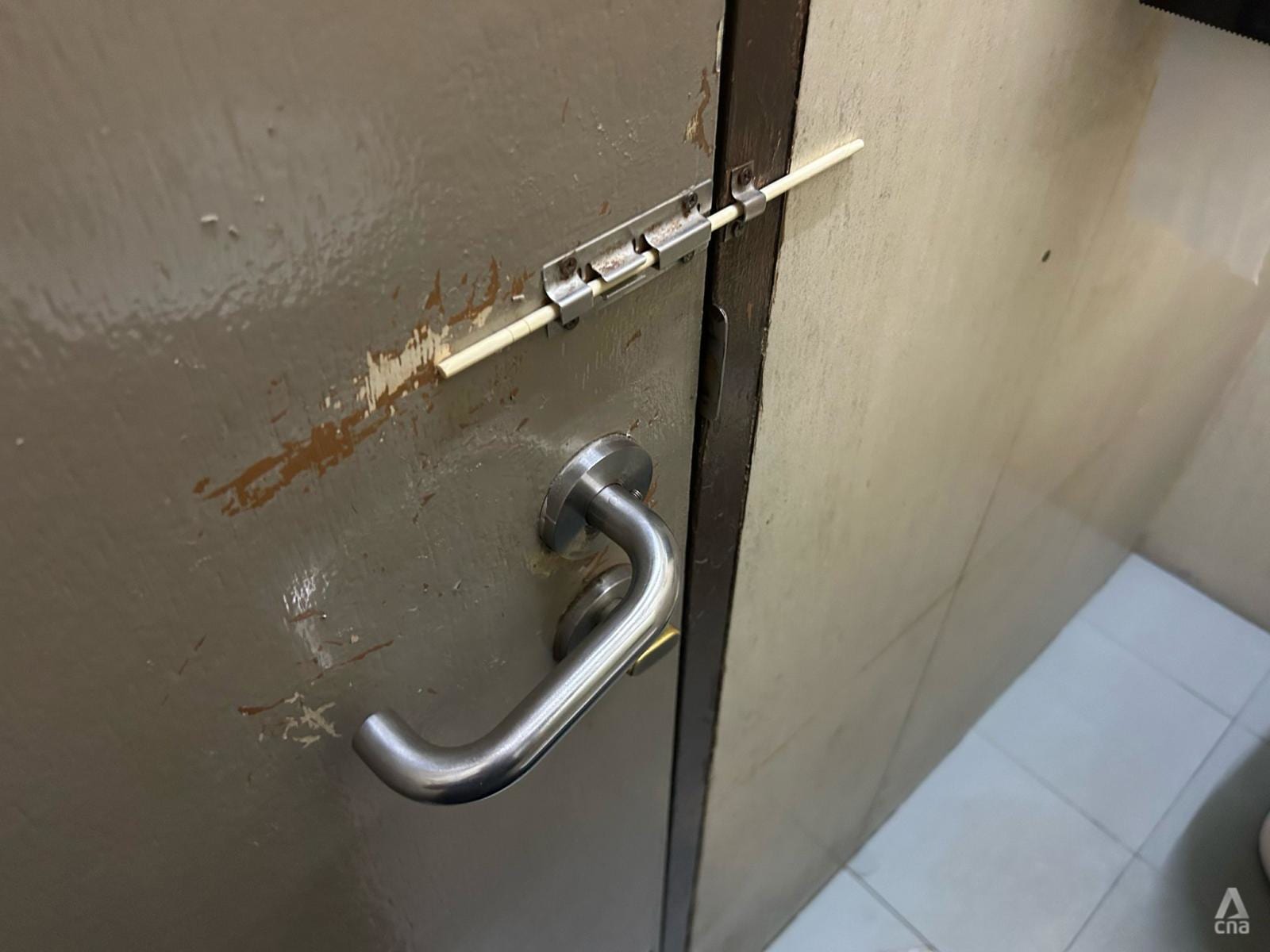
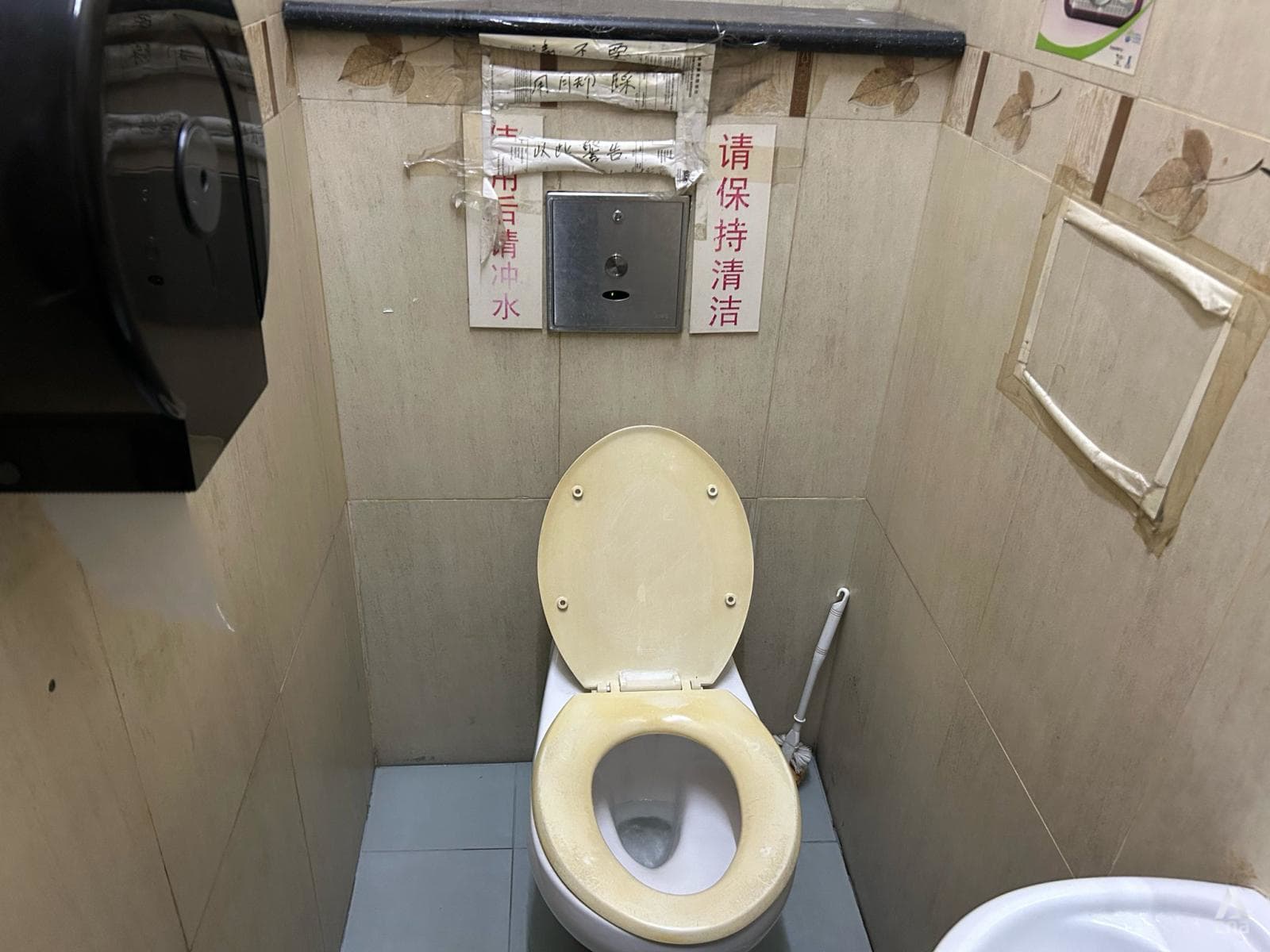
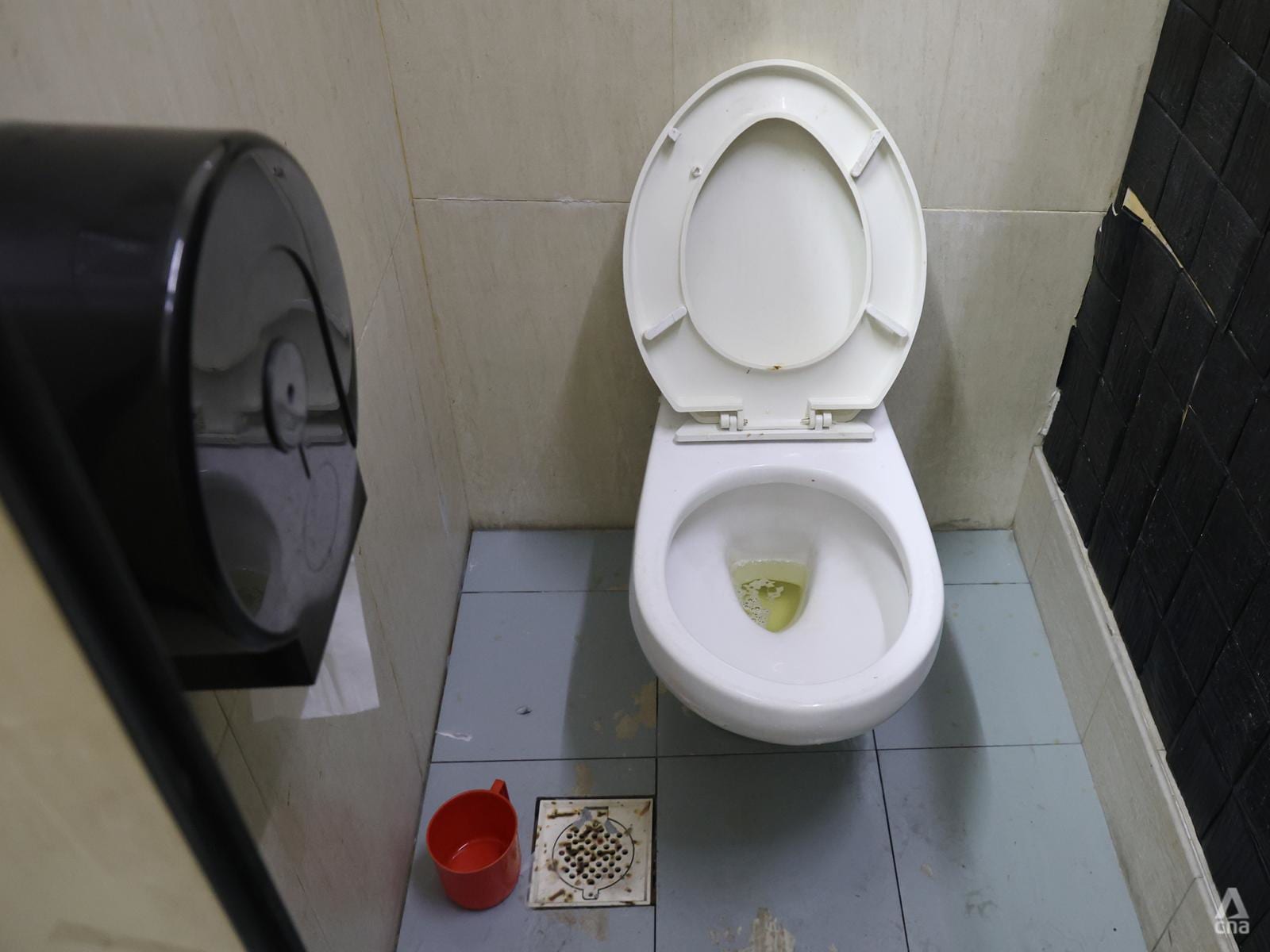
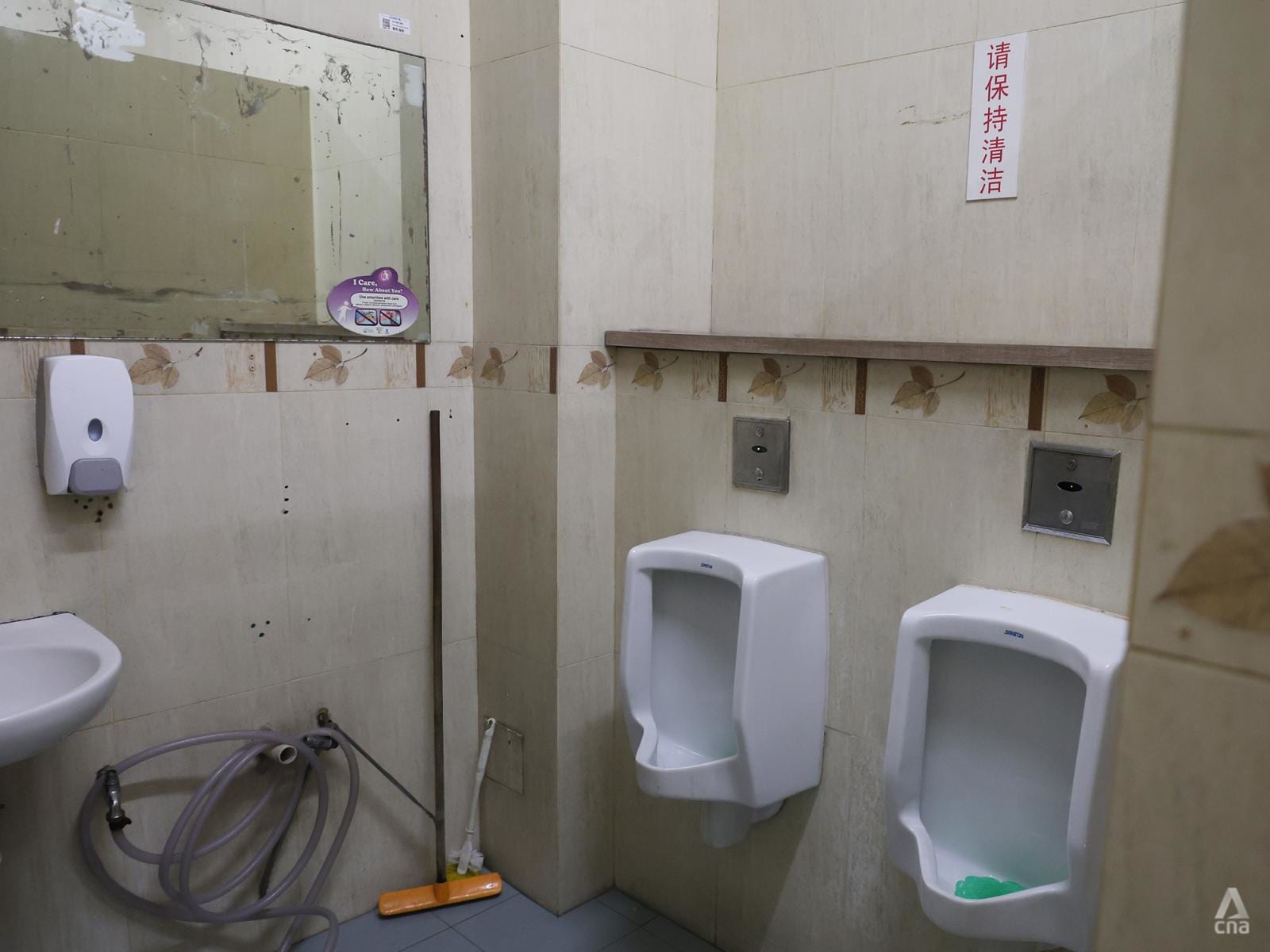
Mr Patrick Ong, 61, a coffee-shop assistant at 27A Coffee Shop, said that although the toilet might be old and stained, it was “clean and did not smell bad”.
“The (enforcement) officer said that it was stained, but no matter how we scrub, the stain won’t come out. What do you want us to do? It is clean, it is just not a five-star hotel standard,” Mr Ong added in Mandarin.
“Renovating is not cheap and it also means that all the stalls have to close. It eats into our earnings … People don’t use the toilet properly and mess it up. What’s the point (of cleaning and renovating) if it's going to get stained and dirtied again?”
Mr Terence Sim, 57, the director of coffee shop Jakopi along Clover Way in Marymount, said he does try to keep his amenities clean but it is difficult to maintain.
For example, as workers from nearby construction sites often use the coffee shop toilet, the toilet floor is often muddy from their work boots.
"We clean the toilet at least four times a day, scrubbing the toilet bowls and floors every time. We also use detergent for a deeper clean before closing," he said, adding that maintaining toilet hygiene costs the company about S$300 a month.
This sum used to be higher as people would steal their toilet paper, he added. Now, users have to ask drink stall employees for toilet paper.
But the money is a necessary expense, he said, as it is needed to ensure they do not put their food license at risk or get fined.
THE LONG AND WEARY WAR AGAINST DIRTY TOILETS
Mr Ong's frustration reflects the long-drawn battle that Singapore's government, hawkers and coffee-shop operators have waged against filthy public lavatories, with one of the earliest initiatives being the Keep the Toilet Clean campaign that was launched in 1983.
That year, the Ministry of Environment spent S$300,000 (equivalent to about S$610,600 today), to repair and renovate toilets in 47 markets and hawker centres. It also launched an education campaign on responsible toilet use, among other things.
Today, licensed retail food establishments including coffee shops can be fined or incur demerit points for not ensuring that their toilets are clean and stocked with basic amenities such as soap and toilet paper.
For failure to provide basic amenities or to keep toilets clean, owners or operators of public toilets can be handed composition fines of up to S$500, NEA and the Singapore Food Agency (SFA) said in response to CNA TODAY’s queries.
Anyone guilty of lapses such as insufficient basic amenities and unclean toilets may also be fined up to S$5,000 for a first conviction under the Environmental Public Health Act 1987.
Under SFA’s Points Demerit System – which was introduced to improve food hygiene standards at retail food businesses – coffee shops with toilet-related lapses can also incur demerit points. If the operator of a coffee shop, food court or canteen accumulates 12 demerit points within a year, the place can be suspended for one to three days.
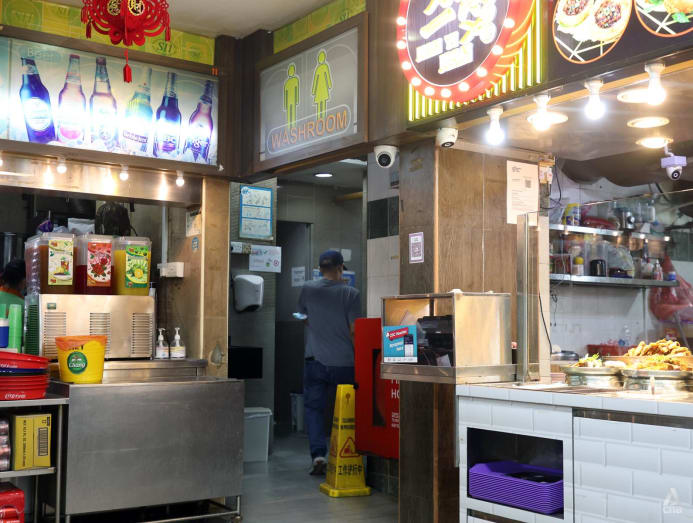
After more than 40 years since that 1983 campaign, the authorities designated 2024 as the “Year of Public Hygiene”, conducting nearly 19,000 inspections of public toilets and taking roughly 1,300 enforcement actions against toilet owners.
Of this, more than 900 were against coffee-shop owners and 11 coffee shops were suspended for toilet-related lapses.
This was a sharp increase from the 240 public toilet-related enforcement actions taken by NEA and SFA in 2023.
The two agencies said that they take a “risk-based approach” in their enforcement.
“The frequency and number of inspections conducted will depend on factors such as footfall, feedback received and previous track record,” they said.
Besides fines and suspensions, there are also less punitive initiatives.
For example, the Restroom Association Singapore’s Happy Toilet Programme rates toilets between three and six stars depending on their cleanliness, design and maintenance.
Participation in the programme, which was launched in 2003 to incentivise public toilet operators to keep their premises clean, is voluntary.
The association, started in 1998 by Dr Jack Sim – who also founded the World Toilet Organization – is a non-profit group that advocates for clean public toilets.
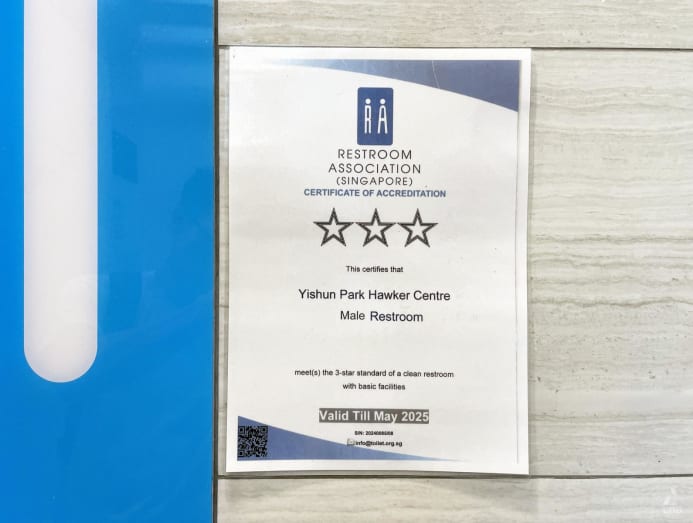
The Public Hygiene Council, formed in 2011 to raise personal and public hygiene standards, introduced the Neighbourhood Toilets Community Group in 2022.
Through this initiative, community volunteers monitor the cleanliness of public toilets and report to participating toilet operators if they come across one that is not in good working condition and they also remind users to keep the toilet clean.
There are seven coffee shops, two bus interchanges and two MRT stations that are part of this initiative.
The council, which comes under the purview of the Ministry of Sustainability and the Environment, said: "We have received promising feedback from the premises operators. They reported that the cleanliness of their toilets has improved as a result of the collective efforts of premises operators, community volunteers and users."
WHAT MORE CAN BE DONE?
Despite the carrot-and-stick approach, these ubiquitous public toilets continue to be a sight and smell to be avoided, as evidenced by the dirty facilities seen by CNA TODAY.
SFA said that five of the six operators fined and suspended a day on Feb 21 this year were also repeat offenders. If fines, campaigns and star ratings cannot stop operators from reoffending, what more needs to be done?
Experts and stakeholders suggested other approaches.
1. CHARGING FOR TOILET USE
Of the 20 customers interviewed by CNA TODAY, 16 said that they would be willing to pay to use a toilet at a coffee shop or hawker centre if it guarantees cleanliness.
This option means that the cost of maintaining toilets at coffee shops is passed to the consumer.
Housewife Claudia Lee, who usually avoids using hawker centre or coffee shop toilets, said: “A few hawker centres already charge for the toilet and they are often not extremely clean. If paying up to 50 cents means I can use a toilet (with peace of mind), why not?”
For now, the 60-year-old prefers to rush home when she needs to use the washroom.
However, there were also some people who said that such toilets are public amenities and should be freely available.
A 70-year-old retiree who gave her name as just Mrs Lee said: “The toilet is a need and every cent counts especially after you retire and are not working. I think toilets should be decent and available for everyone.”
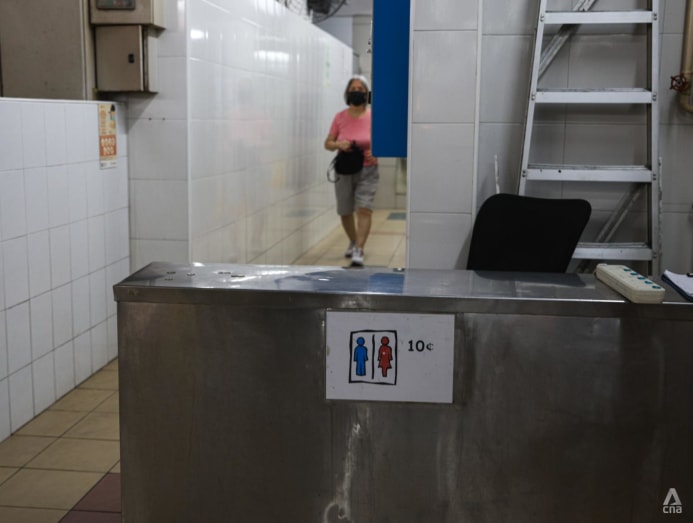
2. NAME AND SHAME
Ms Rosie Ching, a principal lecturer at SMU and lead researcher for the 2024 survey on toilets, titled Waterloo, said that one way to clean up Singapore’s toilets is to name and shame coffee shops and hawker centres with filthy loos.
“If we find it so hard to enforce toilet cleanliness beyond shuttering the bad ones for only a day and fines that barely make a dent in (coffee-shop operators') earnings, public exposure must be heightened,” Ms Ching told CNA TODAY.
She even said that coffee shops with “persistently filthy toilets” should be named in newspapers, online and in public reports.
Ms Ching also proposed launching a twice-yearly “Toilet Hall of Fame” and “Toilet Hall of Shame” initiative. Publishing the names of owners of the best and worst toilets in Singapore had been done by The Straits Times newspaper in the 1980s and it was able to incentivise operators of dirty toilets to clean up the mess, she recalled.
In a similar vein, Dr Sim from the World Toilet Organization said that a mobile application for people to rate toilet cleanliness could incentivise operators to ensure that their toilets are kept clean.
However, Mr Yip Hon Weng, Member of Parliament (MP) for Yio Chu Kang, said that beyond ratings and transparency, more needs to be done.
“The challenge is that existing rating systems, like the Happy Toilets Programme, may not be driving real change,” he told CNA TODAY.
3. INCENTIVES AND GRANTS
Mr Yip, who has filed parliamentary questions on public toilet cleanliness, suggested introducing incentives for coffee shops and hawker centres.
“Coffee shops with consistently clean toilets could receive recognition, lower licensing fees or even priority for government grants,” he said.
The government has introduced grants for coffee shops to clean up their act.
On Mar 4, Mr Baey told parliament that coffee-shop owners will be able to make use of two S$5 million grants: The Coffee Shop Toilet Renovation Grant and Coffee Shop Toilet Deep Cleaning Grant.
Mr Baey said then that although coffee shops are privately operated commercial premises, their toilets are accessible to both patrons and non-patrons.
Through the renovation grant, coffee-shop operators may apply for funding from NEA to cover up to 95 per cent of their toilet renovation costs, capped at S$50,000 for each coffee shop. The agency will also fund up to 95 per cent of a two-year deep-cleaning contract, capped at S$25,000 for every coffee shop, under the deep-cleaning grant.
However, these grants have drawn criticism from several members of the public and experts.
Dr Sim told CNA TODAY: “These coffee shops are being bought for millions of dollars, yet operators won’t spend money on cleaning their toilets. Why should taxpayer money be spent on private operators to clean up their toilets?”
Ms Ching of SMU also questioned if coffee shops will take up the grants.
She noted that NEA’s Toilet Improvement Programme has been taken up by just 44 coffee shops since it was launched in 2020. The grant provides up to 90 per cent funding, capped at S$45,000, for toilets in coffee shops and hawker centres to get better designs, new technologies and effective cleaning measures.
In response to queries, Mr Baey said that coffee shops are private businesses, but operators generally make their toilets accessible to both patrons and non-patrons such as elders, taxi drivers, private-hire car drivers and food delivery workers "as a service to our community".
"These toilets effectively function as neighbourhood public amenities despite being privately operated."
He added that the grants will come with conditions that operators must meet, including mandatory on-site training for cleaners and having the recommended design requirements for the toilets.
The grants are expected to support 10 to 20 per cent of Singapore's coffee shops.
"These upgraded facilities can serve as positive role models, demonstrating how good designs, trained cleaners and regular deep-cleaning can significantly improve toilet cleanliness standards.
"These would in turn encourage positive and responsible behaviour where users would be more inclined to keep the better-maintained toilets clean."
4. GREATER ENFORCEMENT AND HEAVIER PENALTIES
The various alternative approaches may have their supporters and detractors, but the people interviewed by CNA TODAY agreed on one thing: The need for greater enforcement of toilet cleanliness, along with heavier penalties.
“Right now, the punishment for a dirty toilet is just a one-day suspension and a fine, which is a flick on the wrist,” Ms Ching from SMU said. SFA states on its website that repeat offenders can be suspended for up to three days.
The Waterloo study by SMU found that more than 55 per cent of participants felt that heavier fines and more monitoring of toilets were needed.
TIME FOR A TOTAL REFRAME?
Right now, the authorities view the problem as one of food hygiene and public health, but is it time to raise the standard even higher, by positioning public toilets as a service offering?
NEA and SFA told CNA TODAY that clean and hygienic public toilets are “fundamental to public health”.
“Maintaining clean toilets, especially those at our coffee shops and hawker centres, will safeguard public health, support good food safety practices and maintain the hygiene and cleanliness standards of these shared spaces,” they said.
Ms Ching is among those who see this matter as more than just a public health issue.
“Worldwide, public toilets reflect national standards. Singapore has world-class hygiene in places like the Changi Airport. Why are our coffee-shop toilets perennially failing at the most basic levels and for decades?" she asked.
"To have such a chasm of a disconnect is shameful for a purportedly first-world nation.”
She also said that dirty toilets would drive people away from patronising malls or shops, damage the operators’ business reputation and affect their sales.
Yet, the irony is that many regular patrons of these venues do not have high expectations about the toilets there. All 20 customers interviewed said that toilet cleanliness did not affect their choice of where to dine.
In response to this, Dr Sim said: “These (coffee shop) operators don’t see the benefit of keeping the toilets clean … For them, it is about financial benefits and economics, and a dirty toilet does not affect business.
“Some say they even save money on toilet paper, soap, water, electricity (and more) because fewer people will use the toilets if it is dirty.”
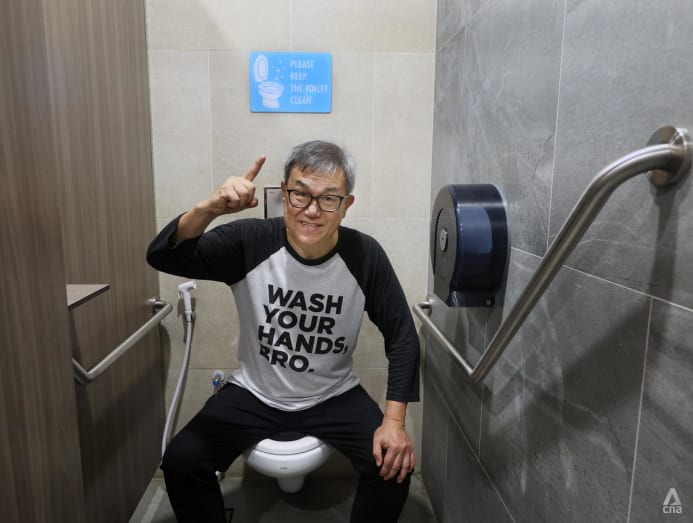
The proposal to charge people for toilet use can provide a monetary incentive for operators, but it also contradicts the notion that the toilets should be public amenities.
Even if a fee is imposed, coffee-shop operators and workers believe that customers will continue to dirty the toilets.
At a coffee shop run by the Kimly Group in Yishun, an employee said that he cleans the toilet at least four times a day, as well as when customers complain about its cleanliness. The toilets are free to use, but users can buy a packet of tissue paper for 20 cents.
When CNA TODAY visited the coffee shop at around 2.15pm last week, a staff member said that the toilet had just been cleaned. While this was evident from the partially wet floor and the smell of air freshener, tissue paper had already been littered above a urinal.
The 35-year-old drink-stall employee, who declined to be named because he was not permitted to speak to the media, said: “Even though we do all this cleaning – I even buy air freshener to make sure the toilet smells good – it never is enough because people will come in and use it without thinking.
“They leave tissue paper behind, somehow pee on the floor and even leave rubbish on top of the dustbin instead of inside the bin.”
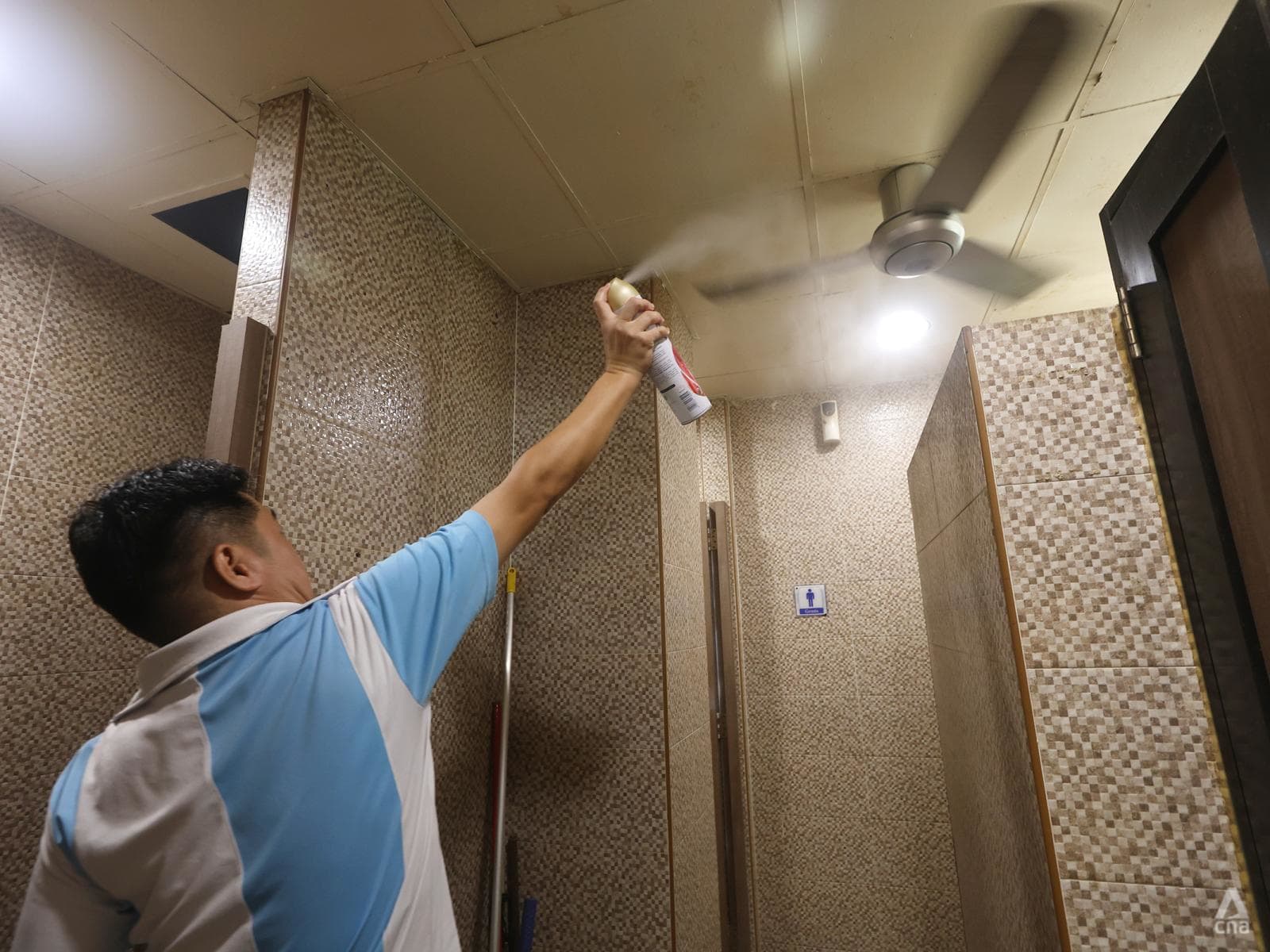
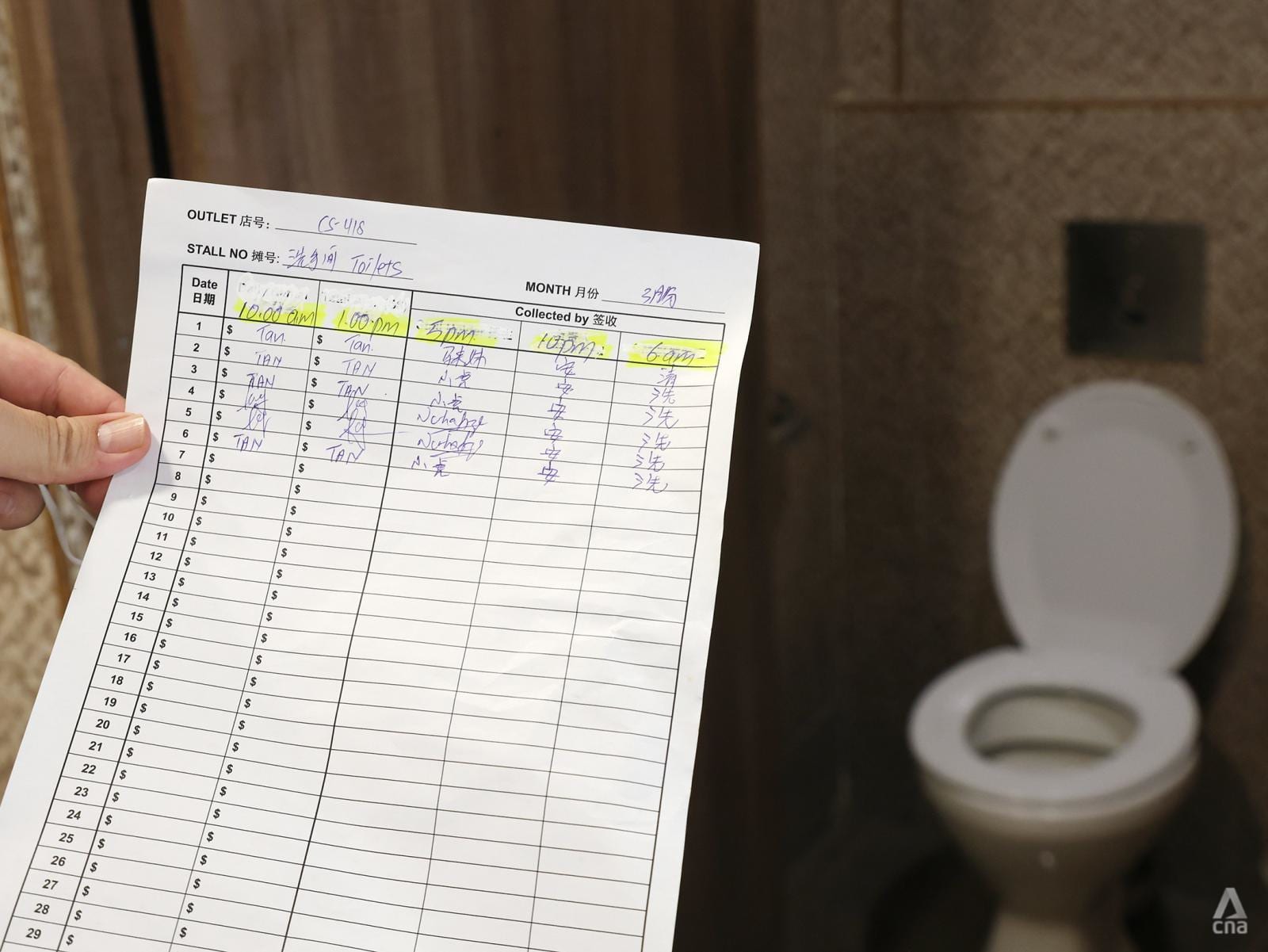
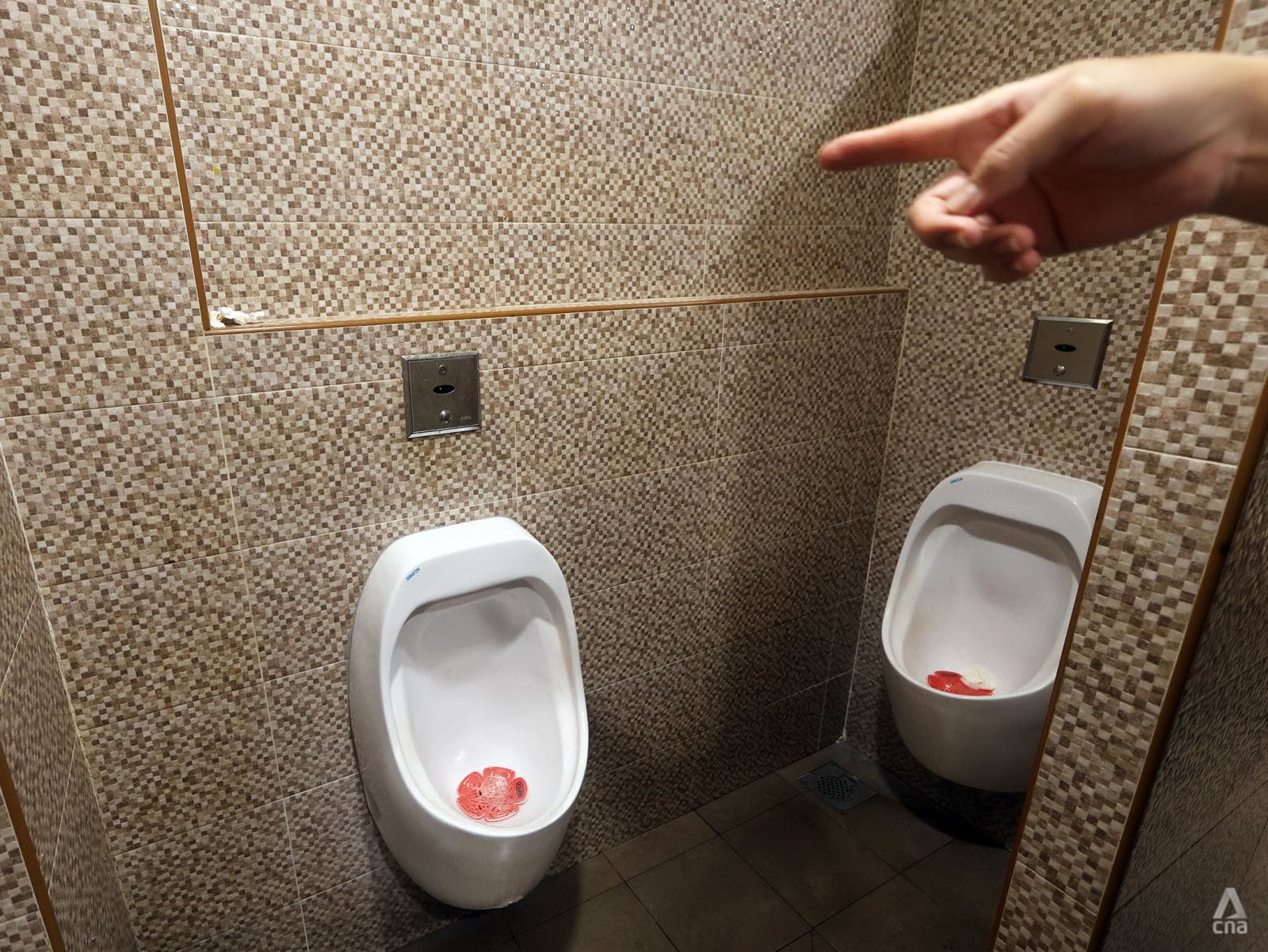
The worker has seen people steal soap from the toilets as well and he has to tie the bottle to the sink to prevent it from being stolen.
FairPrice Group, which oversees 45 hawker centres and coffee shops, said that it faces challenges in keeping the toilets clean. These include high traffic and "diverse building designs".
However, this is addressed through "strategic cleaning" such as aligning the cleaning schedules with peak hours and performing regular deep cleans, it added.
Oily, slippery floors and faeces on the ceiling are among the most notable features of the dirty toilets that Ms Cherry Tan, 30, has encountered in coffee shops where she has dined.
A hawker running Kiang Kiang Teppanyaki food stall in Woodlands, who did not want to be named, said: “At least our coffee shop’s toilet is usually clean but some customers don’t use it properly and make it all dirty. They don't flush or they litter most of the time.”
Operators, hawkers and customers may be blaming operators' sporadic cleaning schedule and hawker patrons for the mess, but Dr Sim from the World Toilet Organization argued otherwise.
The advocate pointed to the Waterloo 2024 study, which found that 94.2 per cent of respondents used toilets at coffee shops and shopping centres.
“The hawker centres and coffee shops also get the same profile of users as malls, so why is it that hawker centres have seen improvement in their toilet cleanliness and toilets in malls are relatively clean, but those at coffee shops are still dirty?
“It’s because the toilets are cleaned (in malls) … Operators of coffee shops and hawker centres need to face more punishment to clean up their act, and we need to stop gaslighting consumers and faulting each other for the dirty toilets.”
In response to CNA TODAY, Mr Baey said that cleaner toilets require a "multi-stakeholder approach".
"Operators must maintain cleanliness standards, users must be considerate and the authorities must enforce effectively," he replied, adding that the authorities are implementing several initiatives beyond grants.
These include expanding the community group programme, refreshing the Restroom Association Singapore's rating programme and trialling a feedback system called ReportLah! in more than 10 coffee shops. This is alongside increasing enforcement efforts, Mr Baey said.
"Cleaner toilets benefit everyone and we are committed to achieving this through this comprehensive approach," he added.
Additional reporting by Ooi Boon Keong












